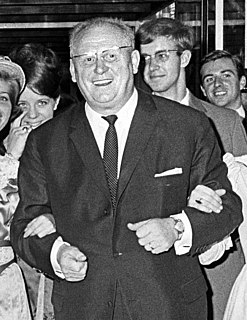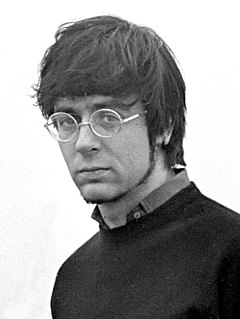
Robert Musil was an Austrian philosophical writer. His unfinished novel, The Man Without Qualities, is generally considered to be one of the most important and influential modernist novels.

Bernd Heinrich Wilhelm von Kleist was a German poet, dramatist, novelist, short story writer and journalist. His best known works are the theatre plays Das Käthchen von Heilbronn, The Broken Jug, Amphitryon and Penthesilea, and the novellas Michael Kohlhaas and The Marquise of O. Kleist died by suicide together with a close female friend who was terminally ill.

Karl Gerhart "Gert" Fröbe was a German actor. He was best known in English-speaking countries for his work as Auric Goldfinger in the James Bond film Goldfinger, as Peachum in The Threepenny Opera, as Baron Bomburst in Chitty Chitty Bang Bang, as Hotzenplotz in Der Räuber Hotzenplotz, General Dietrich von Choltitz in Is Paris Burning? and Colonel Manfred von Holstein in Those Magnificent Men in Their Flying Machines.

Botho Strauß is a German playwright, novelist and essayist.

Heiner Müller was a German dramatist, poet, writer, essayist and theatre director. His "enigmatic, fragmentary pieces" are a significant contribution to postmodern drama and postdramatic theatre.
Higham Ronald Hayman was a British critic, dramatist, and writer who was best known as a biographer.
Emine Sevgi Özdamar is a writer, director, and actress of Turkish origin who resides in Germany and has resided there for many years. Özdamar's art is unique in that it is influenced by her life experiences, which straddle the countries of Germany and Turkey throughout times of turmoil in both. One of her most notable accomplishments is winning the 1991 Ingeborg Bachmann Prize.
Piers Paul Read FRSL is a British novelist, historian and biographer. He was first noted in 1974 for a book of reportage, Alive: The Story of the Andes Survivors, later adapted as a feature film and a documentary. Read was educated at St. John's College, Cambridge, where he studied history.

Mephisto – Novel of a Career is the sixth novel by German-American writer Klaus Mann, published in 1936 whilst he was in exile in Amsterdam. It was published for the first time in Germany in the East Berlin Aufbau-Verlag in 1956. The novel, a thinly disguised portrait of German actor Gustaf Gründgens, adapts the Mephistopheles/Dr Faustus theme by having the main character, Hendrik Höfgen, abandon his conscience and continue to act and ingratiate himself with the Nazi Party to keep and improve his job and social position.

Robert Atzorn is a German television actor. He was born in Bad Polzin, Pomerania, Germany, now Połczyn-Zdrój, West Pomeranian Voivodeship, Poland.

Manfred Sepse Lubowitz, known professionally as Manfred Mann, is a South African–English keyboardist, arranger, singer and songwriter. He is best known as a founding member and eponym of the bands Manfred Mann, Manfred Mann Chapter Three and Manfred Mann's Earth Band.
Carlo Karges was a German musician who became a guitarist and songwriter for the rock band, Nena. He wrote the lyrics of Nena's most famous song, "99 Luftballons", released in 1983. He was attending a 1982 Rolling Stones concert at the Waldbühne in West Berlin, when they released a large mass of helium balloons into the air. He wondered how East German or Soviet forces might react if the balloons crossed the Berlin Wall, and thus he conceived the idea for the song about a major war resulting from misidentification of a mass of balloons.
Peter Zadek was a German director of theatre, opera and film, a translator and a screenwriter. He is regarded as one of the greatest directors in German-speaking theater.
Round Heads and Pointed Heads is an epic parable play written by the German dramatist Bertolt Brecht, in collaboration with Margarete Steffin, Emil Burri, Elisabeth Hauptmann, and the composer Hanns Eisler. The play's subtitle is Money Calls to Money and its authors describe it as "a tale of horror." The play is a satirical anti-Nazi parable about a fictitious country called Yahoo in which the rulers maintain their control by setting the people with round heads against those with pointed heads, thereby substituting racial relations for their antagonistic class relations. The play is composed of 11 scenes in prose and blank verse and 13 songs. Unlike another of Brecht's plays from this period, The Mother, Round Heads and Pointed Heads was addressed to a wide audience, Brecht suggested, and took account of "purely entertainment considerations." Brecht's notes on the play, written in 1936, contain the earliest theoretical application of his "defamiliarization" principle to his own "non-Aristotelian" drama.

Mahagonny, ein Songspiel, or Mahagonny, a song-play, was written by composer Kurt Weill and dramatist Bertolt Brecht and first performed with that title and description in 1927. Elisabeth Hauptmann contributed the words to two of its songs. Just under half an hour in length, the work can be thought of as a staged or scenic cantata. By the end of 1929, however, Mahagonny had grown into a two-hour opera with the title Aufstieg und Fall der Stadt Mahagonny, or Rise and Fall of the City of Mahagonny. This was premiered in March 1930. Today the cantata and the opera are considered separately, the latter holding a place in the repertory, the former being an occasional piece staged in small theaters or programmed as an outgrowth of a song recital when resources permit. For this reason the shorter work is informally referred to as Das kleine Mahagonny, or The Little Mahagonny, or as Mahagonny-Songspiel.
Downfall of the Egotist Johann Fatzer is an unfinished play by Bertolt Brecht, written between 1926 and 1930. Der Untergang des Egoisten Johnann Fatzer, is translated as Downfall of the Egotist Johann Fatzer or Demise of the Egotist Johann Fatzer and often called the Fatzer Fragment, or simply Fatzer.

Thomas Brasch was a German author, poet and film director.

Thomas Ostermeier is a German theatre director. He currently mainly works for the Schaubühne.
Alexandra Wood is a British dramatist. She is a winner of the George Devine Award in 2007.

Peter Palitzsch was a German theatre director. He worked with Bertolt Brecht in his Berliner Ensemble from the beginning in 1949, and was in demand internationally as a representative of Brecht's ideas. He was a theatre manager at the Staatstheater Stuttgart and the Schauspiel Frankfurt. Many of his productions were invited to the Berliner Theatertreffen festival. He worked internationally from 1980.











